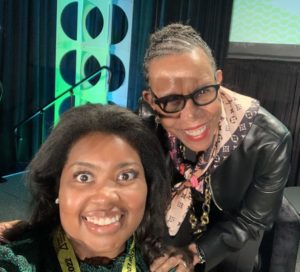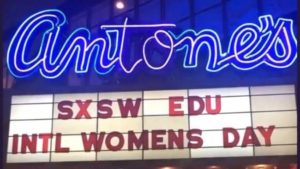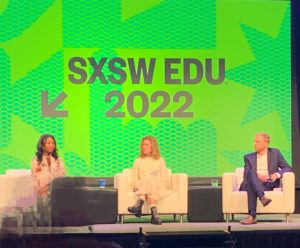 Arriving in Austin, Texas on a beautiful Sunday afternoon in March 2022, I was filled with excitement to be in one of my favorite cities to attend the South by Southwest Education Conference (SXSW EDU). As my first in-person conference in almost three years, it was a special treat to attend innovative sessions and enjoy the dynamic conference speakers.
Arriving in Austin, Texas on a beautiful Sunday afternoon in March 2022, I was filled with excitement to be in one of my favorite cities to attend the South by Southwest Education Conference (SXSW EDU). As my first in-person conference in almost three years, it was a special treat to attend innovative sessions and enjoy the dynamic conference speakers.
With an overarching theme of equity interwoven through all conference sessions, this year did not disappoint. For me, two key takeaways included:
- Recruiting, hiring, and career advancement practices are increasingly being evaluated through an equity lens. Historically Black Colleges and Universities (HCBUs) are leading in developing a sustainable and diverse talent pipeline.
- Traditional approaches to funding and grantmaking do not fully support equitable access to emerging organizations or entrepreneurs. Organizations need to not only implement change within their organizations, but work to ensure equitable change across the sector.
After an efficient check-in process, modified to incorporate COVID protocols, the first session I attended, “HBCUs Embracing the Future of Work,” had special meaning to me as a proud graduate of Spelman College, a Historically Black College & University (HBCU). I will also name my bias in that two of the panelists were the president of my alma mater, Dr. Mary Schmidt Campbell, and the president of neighboring Morehouse College, Dr. David Thomas, where I attended many management classes. Rounding out the panel was the president of our local Dallas HBCU, Dr. Michael Sorrell of Paul Quinn College.

The panel discussed how many companies seeking to develop more equitable recruiting and career advancement practices, are looking to build relationships with HBCUs as one way to create and sustain more diverse talent pools. The college presidents covered many topics but discussed in detail the unique education-to-career pathways that help both traditional and non-traditional students get the skills and experience needed to stay competitive in a post-pandemic economy. Sessions discussing reckoning race in the classroom, inequity in data collection, and managing difficult conversations on bias and equity rounded out my first day of the conference. I truly appreciated the wide range of speakers and insights they brought to the conversations.
 The second day of the conference I attended student-focused sessions discussing early childhood and inequities in higher education. I ended the day by attending an International Women’s Day Celebration at the legendary Austin music venue, Antone’s. It was wonderful to celebrate the day in person with fellow education professionals and hear from inspirational women discussing their work in #breakingthebias. Speakers included Elisa Villanueva Beard, CEO of Teach for America, Michelle Geddes of Edmentum, and Nadia Siddiqui of Texas Health Institute, and covered topics including elevating teaching as a profession and creating opportunities for girls. The conversation expanded beyond the US as Michelle from Edmentum highlighted the work being done through Alight in Uganda. The organization seeks opportunities and ways to support women and girls in not only feeling safe, but also achieving their dreams. This conversation was especially of interest to me in support of Redstone clients working in to remove barriers to critical services and improve developmental outcomes for children in eastern Africa. The evening wrapped up with a live taping of the gen/activist podcast Rosa Rebellion, with co-founders Meagan Harding and Virginia Cumberbatch, long time educator Dr. Sylvia Rousseau, and artist Deborah Roberts discussing various topics with an intergenerational lens and how they each contribute to advancing equity and justice through their work in education and the arts respectively.
The second day of the conference I attended student-focused sessions discussing early childhood and inequities in higher education. I ended the day by attending an International Women’s Day Celebration at the legendary Austin music venue, Antone’s. It was wonderful to celebrate the day in person with fellow education professionals and hear from inspirational women discussing their work in #breakingthebias. Speakers included Elisa Villanueva Beard, CEO of Teach for America, Michelle Geddes of Edmentum, and Nadia Siddiqui of Texas Health Institute, and covered topics including elevating teaching as a profession and creating opportunities for girls. The conversation expanded beyond the US as Michelle from Edmentum highlighted the work being done through Alight in Uganda. The organization seeks opportunities and ways to support women and girls in not only feeling safe, but also achieving their dreams. This conversation was especially of interest to me in support of Redstone clients working in to remove barriers to critical services and improve developmental outcomes for children in eastern Africa. The evening wrapped up with a live taping of the gen/activist podcast Rosa Rebellion, with co-founders Meagan Harding and Virginia Cumberbatch, long time educator Dr. Sylvia Rousseau, and artist Deborah Roberts discussing various topics with an intergenerational lens and how they each contribute to advancing equity and justice through their work in education and the arts respectively.
There  were many other insightful sessions during my time at the conference. Of key relevance to the work we do at Redstone was, “Pathways to Impact: New Approaches for Funders,” featuring panelists Angela Jackson of Kapor Enterprises, Amy Klement of Imaginable Futures, and Patrick Methvin from the Bill and Melinda Gates Foundation. Moderated by Tom Dawson of Strada Education Network, over the hour-long session speakers shared how their organizations are deploying new approaches to funding including risk-tolerant, sector-agnostic capital, and incorporating vertical and/or horizontal integration to catalyze change across systems. As a professional in the social impact space with a specific focus on working with philanthropic organizations to define and refine their grantmaking and impact investment strategies, it was particularly motivating to hear funders talk about not only how they are adjusting their organizational approach to funding, but also their efforts to influence change across the sector to support equitable access.
were many other insightful sessions during my time at the conference. Of key relevance to the work we do at Redstone was, “Pathways to Impact: New Approaches for Funders,” featuring panelists Angela Jackson of Kapor Enterprises, Amy Klement of Imaginable Futures, and Patrick Methvin from the Bill and Melinda Gates Foundation. Moderated by Tom Dawson of Strada Education Network, over the hour-long session speakers shared how their organizations are deploying new approaches to funding including risk-tolerant, sector-agnostic capital, and incorporating vertical and/or horizontal integration to catalyze change across systems. As a professional in the social impact space with a specific focus on working with philanthropic organizations to define and refine their grantmaking and impact investment strategies, it was particularly motivating to hear funders talk about not only how they are adjusting their organizational approach to funding, but also their efforts to influence change across the sector to support equitable access.
My time at SXSW EDU was educational, inspiring, and relevant. Since that time, I have connected with many new people I met at the conference and reconnected with some I’d lost touch with over the past few years. I look forward to continuing to build upon the conversations started at the conference as I continue my work in the social impact space.